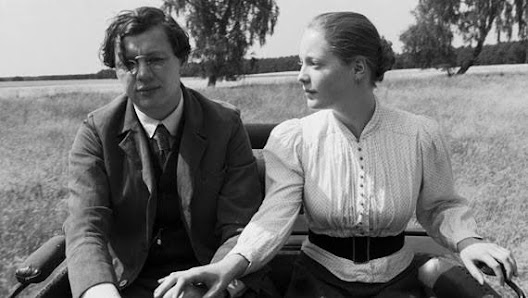MARTIN: I gave God a chance to kill me. He didn't do it, so he's pleased with me.
Hello everyone and welcome to this week's post! I chose a slow-paced film for this week called The White Ribbon by the auteur Michael Haneke. There is a lot to talk about this film and I can't wait to share my thoughts with you! Thanks for being here and I hope you enjoy reading the post!
As usual, let's give a little background about the movie. The film takes place in a small German village in the years close before World War I. Throughout the film, a shocking series of incidents happen to the village, and the residents are left questioning who might have committed those crimes. In the end, however, we don't know who is behind those crimes, it's up to the audience's interpretation.
As this was my first Haneke film, I didn't know that his films are often left open-ended. The reason is that he wants his audience to work on his films and put some thought into them, which I find very meaningful. Reading some critics about the film, I can say that he was indeed successful in provoking the audience to think deeply about the characters and their stories. Now we mentioned, let's talk about some of the characters of the film.
As there are many characters, I'm only going to mention the children and the adults in the film because the main conflict is between those two groups. Starting with the children of the village, we can see that Haneke challenges the concept of children's innocence and shows that they can be as evil as adults. In some scenes, we see one of the steward's sons malevolently pushing Sigi into the water, the pastor's elder daughter Klara killing her father's bird, and the farmer's son deliberately destroying Baroness' cabbage field (1). While the film doesn't show what exactly led these children to behave this way, the audience can link their parents' authoritative behaviour to it.
At this point, it's important to mention that Haneke wanted to add a hint of politics in his film as well. In the beginning sequence, we hear the narrator saying:" (...) But I think I must tell you of the strange events that occurred in our village. They could perhaps clarify some things that happened in this country." Hinting about the rising fascism in Nazi Germany, the narrator tries to link the extremist population forming in the country with those people's malicious behaviours earlier in their childhoods. While Haneke makes it clear that the film isn't directly about Nazi Germany, he creates a great portrayal of the rising of an extremist generation. I recommend watching Haneke's great press conference that touches on this subject from here!
Coming to the adults of the village, let's look at this picture from a scene that tells a lot about the father figure's authority over his children. The children look hesitant and uncomfortable around him, and rightfully so as the father (Pastor) reprimands them quite often whether it's banning the children from having dinner or caning them in public. In reaction to this parental control the children have to go through in their daily lives, they commit the crimes mentioned earlier in the post.
Besides the crimes we witness on the screen, there are other mysterious ones whose perpetrators are never shown: Who beat the Baron's son Sigi? Who set the barn on fire? Who attacked Karli savagely? The film hints that it was either the children of the village or The Doctor who tried to conceal his own crimes by creating bigger ones. My interpretation is that I don't think it's important to know who did the crimes as the film was intended to be a socio-political commentary in the essence.
Reaching the end of this post, I'm giving this movie its 8 out of 10. My only complaint would be with the film's introduction to the characters, in some parts I got lost and couldn't recognize some faces. That being said, I absolutely adored the novellike approach to the film, the broad of the subject and the characters really gave the taste of reading a classic novel.
I'd like to thank you for reading this far and please don't forget to check out my Instagram, Twitter, and Tumblr, all with the same nickname moviesatdawn. You can also comment down below or send me your suggestions to: moviesatdawn@gmail.com! Thanks for reading and I'll see you in another post!
Michael Haneke:" We simply depict a group of children who absolutize the ideals preached to them by their parents. On the basis of these ideals, the children judge their parents. And when they realize that the parents do not live by the rules they preach, the children punish the parents."
Next post: La Haine (1995) dir. Mathieu Kassovitz





Comments
Post a Comment